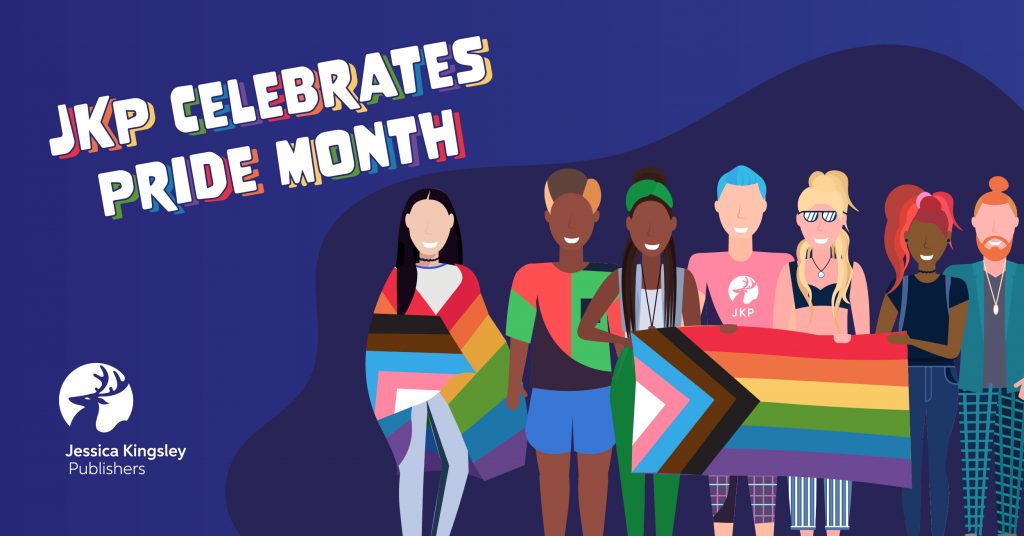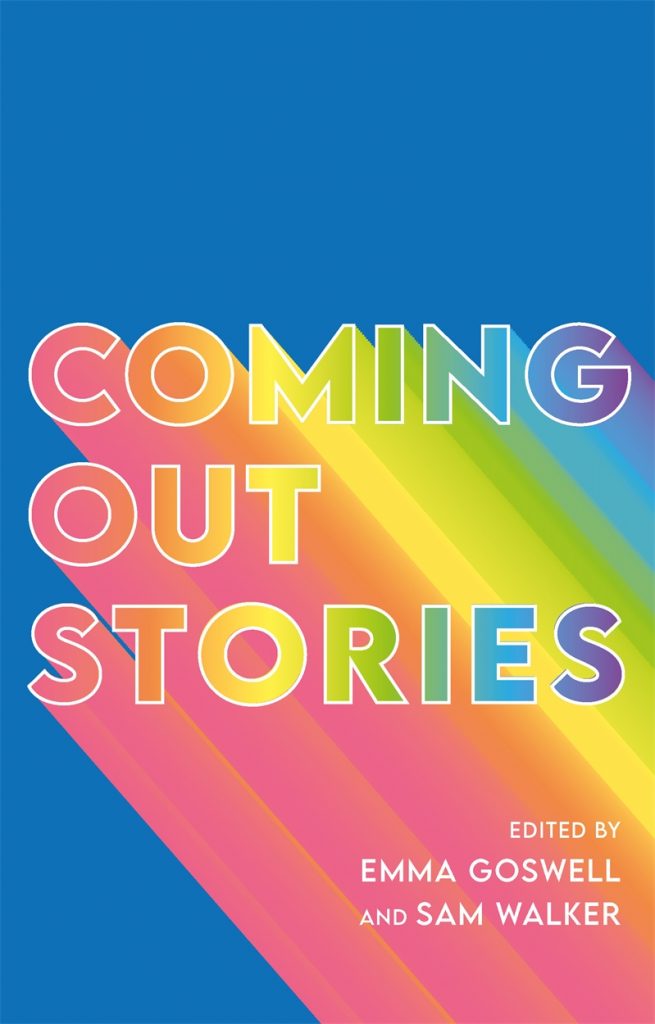
Emma Goswell, creator and host of the popular podcast ‘Coming Out Stories’ and editor of the forthcoming book of the same name, on why coming out is still such a difficult but important thing to do.
Why should people in the LGBT+ community have to come out? It’s a question I get asked a lot.
More often than not it’s from well meaning, straight, CIS gender people who don’t get what all the fuss is about. “I don’t have to announce my sexuality or gender identity so why should you have to?” or “Gay people can marry now. It’s not exactly a taboo anymore is it?” or “It’s 2020 why can’t we all just get on with it?” Well quite! I’d love nothing more than to ‘get on with it’ and for coming out to be a non issue or a non event. But it rarely is. Even in 2020 coming out can be a big deal. I’d love nothing more than to walk down the street holding my girlfriend’s hand without getting the odd, odd look or casual homophobic comment. I’d love there to be no need for a charity like the Albert Kennedy Trust who supports young LGBT people thrown out of their homes because of their sexuality or gender identity. And most of all I’d love the 27 trans people (most of whom were black trans women) who were murdered in the USA alone last year to still be here and living their beautiful lives to the full. But they’re not.
As has become patently clear in the last few weeks, we still don’t live in a world without racism. We still live in a world where people are judged by the colour of their skin. Sadly, we also still live in a world with homophobia and transphobia, where people are judged or seen as other because of their perceived gender or sexuality. Coming out can have its costs. I’ve spoken to people who have never spoken to their parents again and never been able to repair the damage caused to their relationship by ‘coming out’. I’ve spoken to people who have been physically assaulted for their sexuality or gender identity, those who have been made homeless by coming out and one who was thrown out of the RAF for being gay. I spoke to one person who was subjected to so called ‘gay cure therapy’ and one person who was even offered a lobotomy when she was forced to tell a doctor she was a lesbian. Admittedly that was the 1960s, but the gay cure therapy example was in the last decade. And I as write this in ‘Pride’ month 2020, our own government still haven’t made good on their promise to make gay cure therapy illegal in the UK.
Yes, coming out is still a big deal. Sometimes it takes people years to pluck up the courage. Last week a man from Colorado called Kenneth Felts came out as gay after being in the closet for 90 years! He’d fallen in love with a man called Philip in the 1950s but couldn’t cope with coming out then so went on to marry a woman. When he eventually DID come out for Pride month he told the Denver Post what it was like coming out of the closet:
“I had great trepidation as to what people would say. I was very concerned because I needed people and I couldn’t stand the thought of losing them just because I decided to finally be who I really was.”
And that’s the fear all LGBT people face. The fear of rejection. The fear of losing it all. As Kenneth said, “I needed people”. He’s right, we all need people!
But although coming out can have the worst repercussions, (people really do lose people) my community keeps on doing it. There’s an innate human need to be loved and understood. And to be loved and understood for who we REALLY are when the closet doors are blown off.
I started the podcast because I understand what a difficult process it is to come to terms with your own sexuality or gender identity and come out. I wanted there to be some sort of resource there for people to turn to who were at the beginning of their journey. I thought it might be useful to hear how other people had approached it and how it had turned out for them. I wanted a team of virtual uncles and aunts from the LGBT community who had already blown their closet doors off, been around the rainbow block a few times and could impart their knowledge like a crack team of queer, wise Yodas.
Since I’ve been putting the podcast out in the world I’ve also realised it’s a brilliant resource for those who have an LGBT person in their lives but don’t fully understand what they’ve been going through. I hope the podcast may act as some sort of guide as it certainly shows the best and worst when it comes to parenting. From the parents who refuse all contact with their children to the dad who bought his daughter a beer to congratulate her on coming out – a myriad of approaches to parenting are on display!
Over the last two years I’ve interviewed around 80 people and every story is as individual as the person telling it. From young to old, from royalty to celebrities to teenagers living at home, everyone has the same fear and their own way of dealing with it and coming out. I’ve heard from a non-binary person who sent their mum an email with attachments to help them understand. I’ve heard from a lesbian who came out on stage. I’ve heard from people who have written letters, made phone calls, sent texts or even covered their own face so they couldn’t see their parents’ reactions when they come out. Always the fear. I even heard from one person who was so convinced they’d be thrown out of the family home they had a bag packed and had a friend waiting around the corner with a getaway car. It didn’t happen.
Of course, I have heard from people whose worst fears HAVE been realised. I heard from one gay man whose own sister refused to visit him even when he fell so gravely ill he was in a coma. I spoke to one person who slept on the streets of Manchester for months after being thrown out of home. But for the most part even if there’s drama, misunderstanding and an initially bad reaction; parents, carers, friends and siblings DO come round. Sometimes that’s a journey that can take weeks, sometimes it can take years. I heard form one lesbian whose mum threatened to divorce her dad, she took it so badly. Fast forward a year and that mum was going out to gay bars with her daughter and bought her a card with a rainbow on because it ‘reminded her of gay pride’.
And for those who do have to go it alone and start again, there is the solace that eventually people do find their own family. If there’s one message hidden in all the many stories I’ve collected, it’s that it does get better. People find new homes, new hope, new love and their own logical, if not biological, family.
So why should we have to come out? We shouldn’t – but every single LGBT person I’ve spoken to categorically says they’ve been happier and healthier since they did. And the more we keep doing it the more we can normalise it and stop young gay, bi and trans people going through the trauma and shame of denial.
The more we keep doing it, the bigger and stronger our community can get. It’s the same reason we need Pride month and Pride marches. To inspire others, to make us visible and to tell those people hiding in the shadows it’s ok to be different. It’s ok to be you.
As a teenager I marched in my first Pride march in London in the very early 90s. Two years earlier I was too afraid to come out, convinced I had a dirty secret that no one could ever know. To march through a city with thousands of other LGBT people was incredibly powerful. I realised for the first time I wasn’t alone on my journey. I wasn’t wrong. I was me and that was something to celebrate. I was so unbelievably glad I’d eventually had the strength to come out and I was immensely grateful too for all of the thousands of people who were marching with me. I was grateful that they’d also had the strength to rise above the parapet, to blow open the closet doors and shout “we’re here, we’re queer – and we’re not going shopping!”
So, coming out? No – we shouldn’t HAVE to – but I’m sure as hell glad I did.
You can hear Coming Out Stories the podcast on Spotify or wherever you get your podcasts.
Coming Out Stories, the book, is available to pre-order on Amazon and Waterstones.
You can follow Emma Goswell on Twitter here, and Coming Out Stories here.
